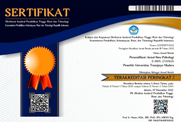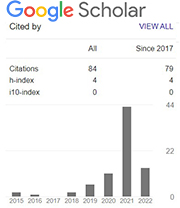Helping Behaviour and Knowledge Sharing Behaviour Moderated with Islamic Work Ethics among the Educational of Higher Institution
Abstract
Keywords
Full Text:
PDF (Bahasa Indonesia)References
Ali, A. J. & Al-Owaihan, A. (2008). “Islamic work ethic in Kuwait”. Journal of Management Development, 14(2), 366-375. DOI:10.1108/13527600710745714
Beekun,R. (1997). Islamic business ethics, IIIT Publications.
Davenport, T. B. H., Prusak, L., & Webber, A. (2000). Invitation send a comment submit an article subscribe working knowledge: How organizations manage what they know.
Dovidio, J.F. & Penner, L.A. (2007). Helping and Altruism. Blackwell Handbook of Social Psychology: Interpersonal Processes. United States: Blackwell Publisher. DOI:10.1002/9780470998557.ch7
Duan, J., Wong, M., & Yue, Y. (2018). Organizational helping behavior and its relationship with employee workplace well-being. Career Development International.
Goncalves, T., Curado, C., & Martsenyuk, N. (2022). I share, we share? A mixed- method analysis of helping behaviors, HRM practices and knowledge sharing behavior, 459-468.
Javaid, M., Abdullah, N.H., Zeb, A. & Hussain, K. (2017). The impact of authentic leadership on knowledge sharing behavior with the moderating role of islamic work ethics. International PostGraduate Conference on Applied Science & Physics, 1-10
Kidwell, J.J., Linder, V.K., & Johson, S.L. (2000). Applying corporate knowledge management practices in higher education. Educause Quarterly, 23(4), 28-33.
Le, P. B., & Lei, H. (2019). Determinants of innovation capability: the roles of transformational leadership, knowledge sharing and perceived organizational support. Journal of Knowledge Management, 23(3), 527–547. DOI:10.1108/JKM-09-2018-0568
Lee, S., Byun, G., & Kim, S. (2021). Effects of coworkers’ helping behavior on employees’
Lin, H. F. (2007). Effects of extrinsic and intrinsic motivation on employee knowledge sharing intentions. In Journal of Information Science, 33(2), 135-149. https://doi.org/10.1177/0165551506068174
Malik, M. T. & Malik, N.A. (2018). Islamic work ethics with organizational citizenship behavior, knowledge sharing behavior and organizational commitment, a study on AJK Colleges. Islamabad Islamicus, 1(1), 1-12.
Murtaza, G., Abbas, M., Raja, U., Roques, O., Khalid, A., & Mushtaq, R. (2016). Impact of islamic work ethics on organizational citizenship behaviors and knowledge-sharing behaviors. Journal of Business Ethics, 133, 325-333. DOI:10.1007/s10551-014-2396-0
Putra, I.D.G.U., & Rustika, I.M. (2015). Hubungan antara perilaku menolong dengan konsep diri pada remaja akhir yang menjadi anggota tim bantuan medis janar duta fakultas kedokteran Universitas Udayana. Jurnal Psikologi Udayana, 2(2), 198-205.
Rizk, R.R. (2008). Back to basics: an Islamic perspective on business and work ethics. Social Responsibility Journal, 4(1/2), 246-254. DOI:10.1108/17471110810856992
Sarfraz, Z., Sarfraz, A., Iftikar, H. M., & Akhund, R. (2021). Is covid-19 pushing us to the fifth industrial revolution (Society 5.0)? Pakistan Journal of Medical Sciences, 37(2), 1–4. DOI:10.12669/pjms.37.2.3387
Sopandi, O.D. & Saud, U.S. (2016). Implementasi knowledge management pada Perguruan Tinggi. Jurnal Administrasi Pendidikan, 23(2), 1-13.
Vieira, A., & Sehgal, A. (2017). How banks can better serve their customers through artificial techniques. Digital Marketplaces Unleashed, 311–326. DOI:10.1007/978-3-662-49275-8_31
Yi, J. (2009) A measure of knowledge sharing behavior: scale development and validation, Knowledge Management Research & Practice, 7(1), 65-81. DOI:10.1057/kmrp.2008.36
DOI: https://doi.org/10.21107/personifikasi.v14i2.19683
Refbacks
- There are currently no refbacks.
Copyright (c) 2023 Salsabila Arum Pratiw, Faraz Faraz

This work is licensed under a Creative Commons Attribution 4.0 International License.


Personifikasi by Universitas Trunojoyo Madura is licensed under a Creative Commons Attribution 4.0 International License.










